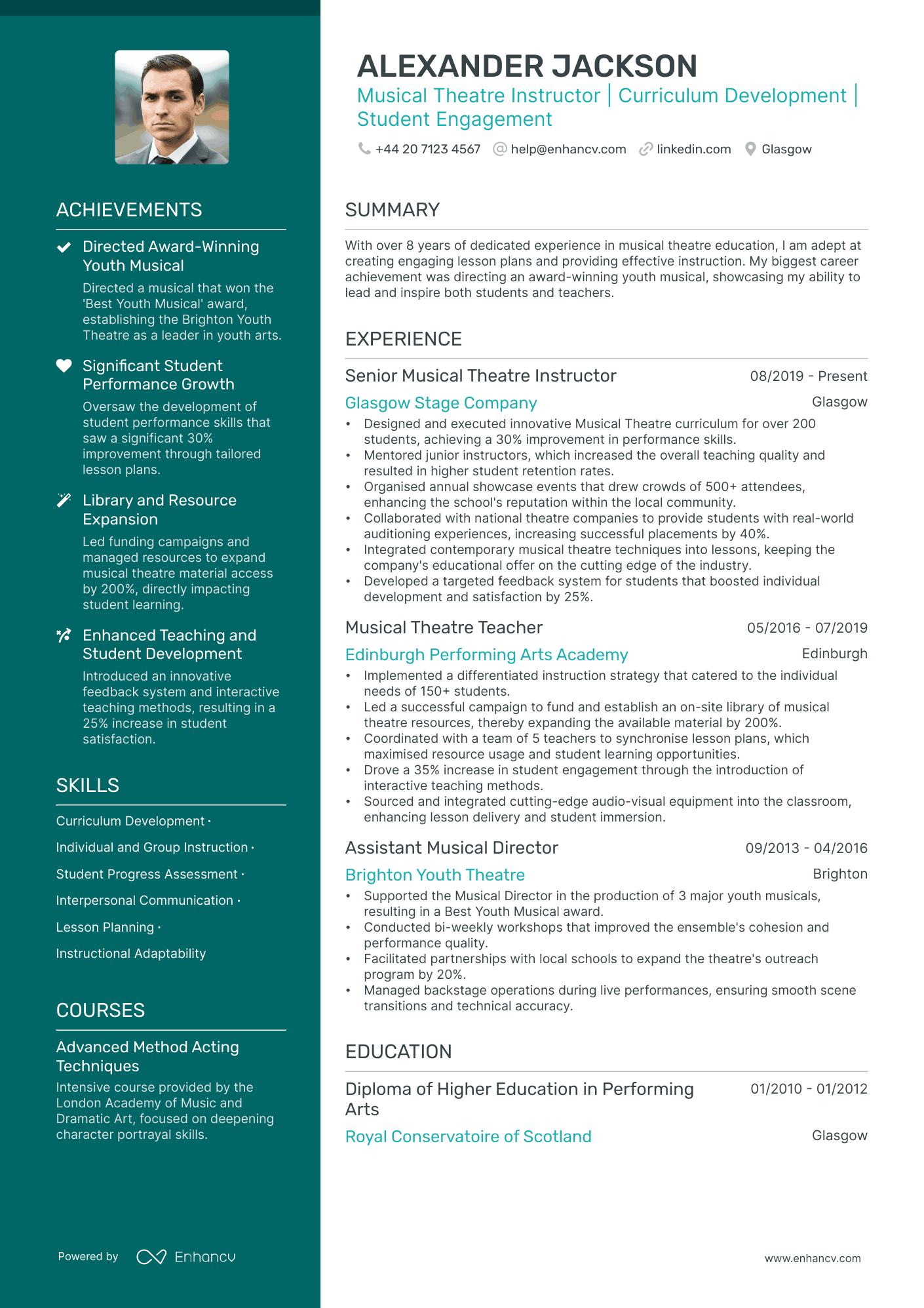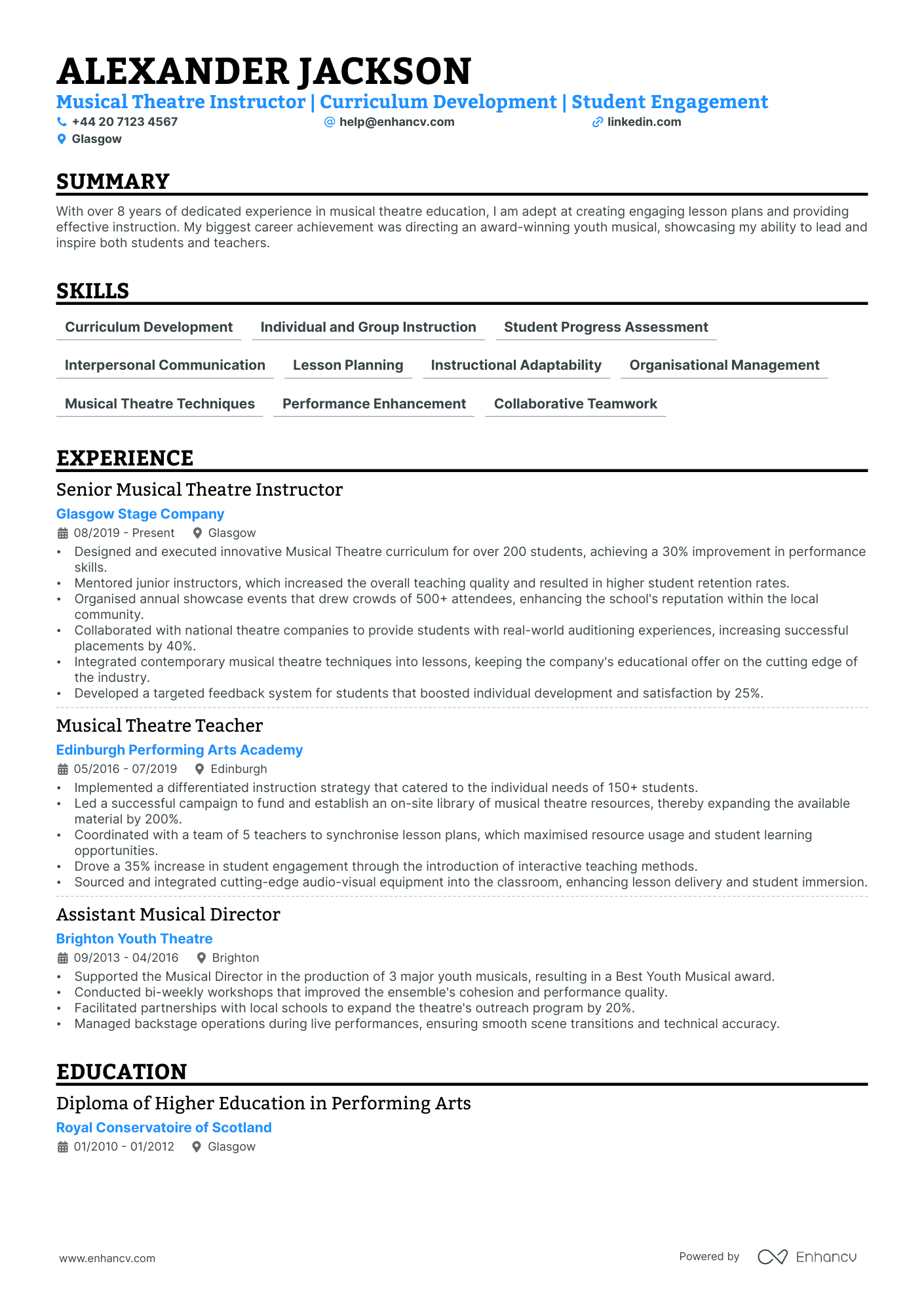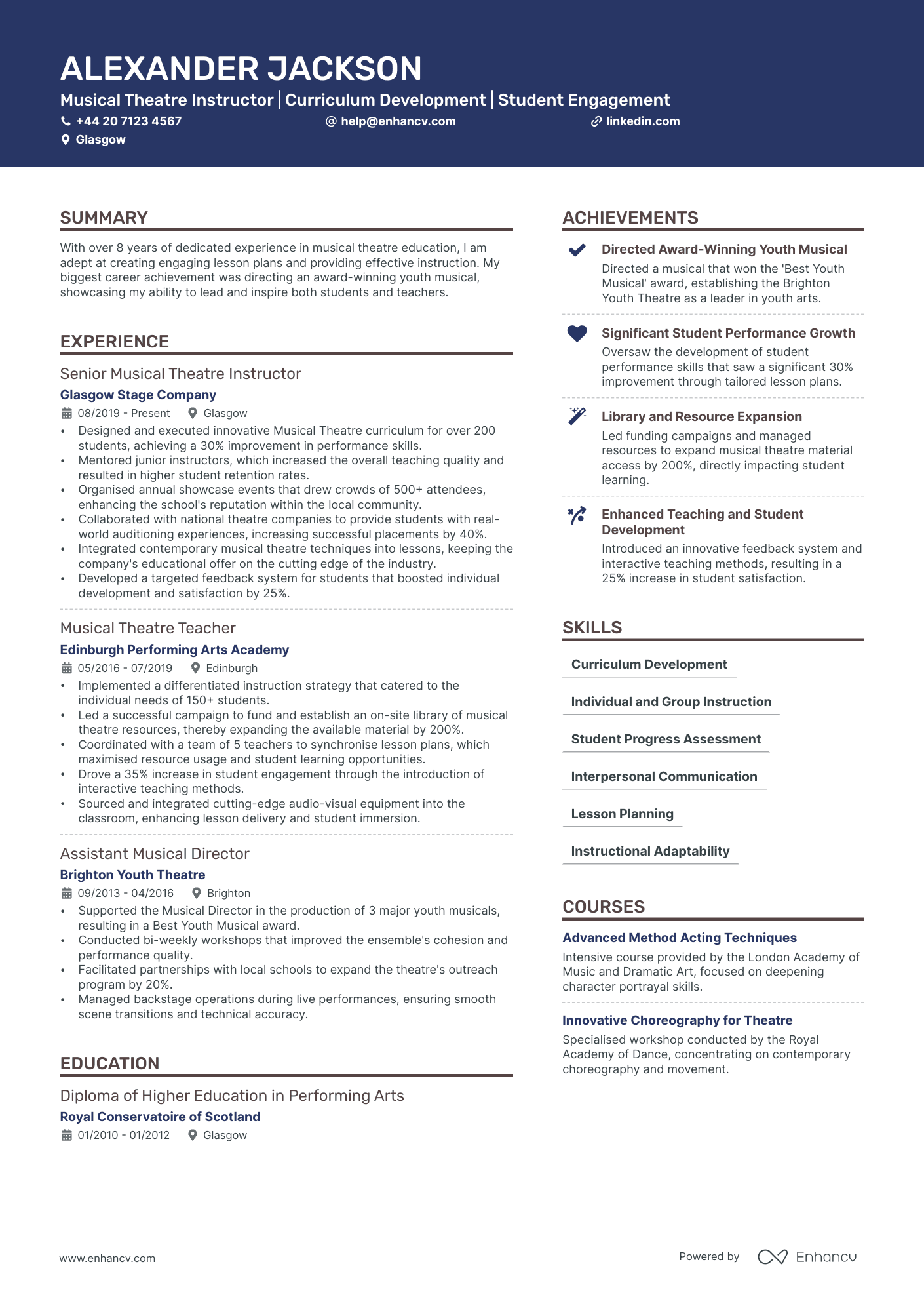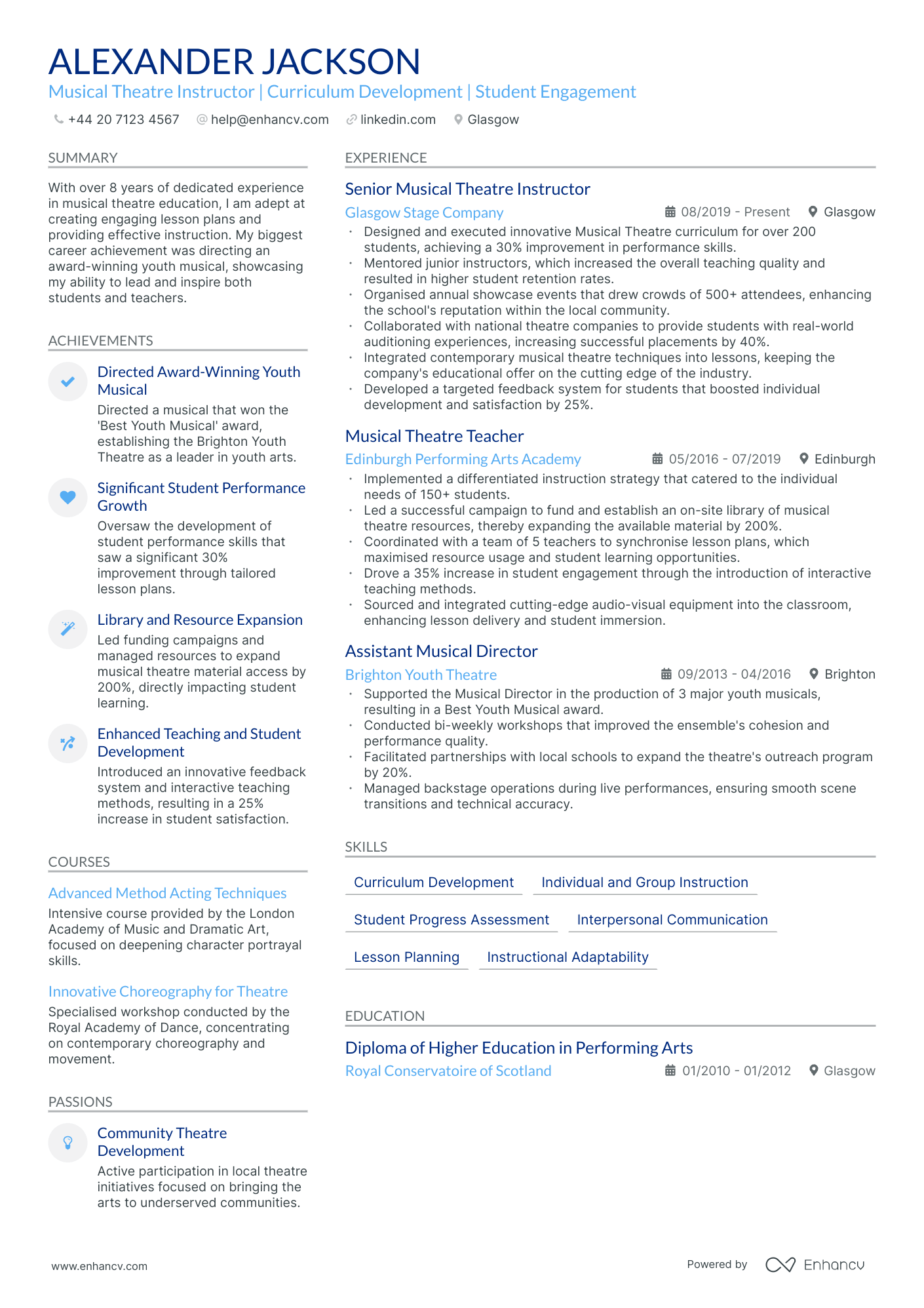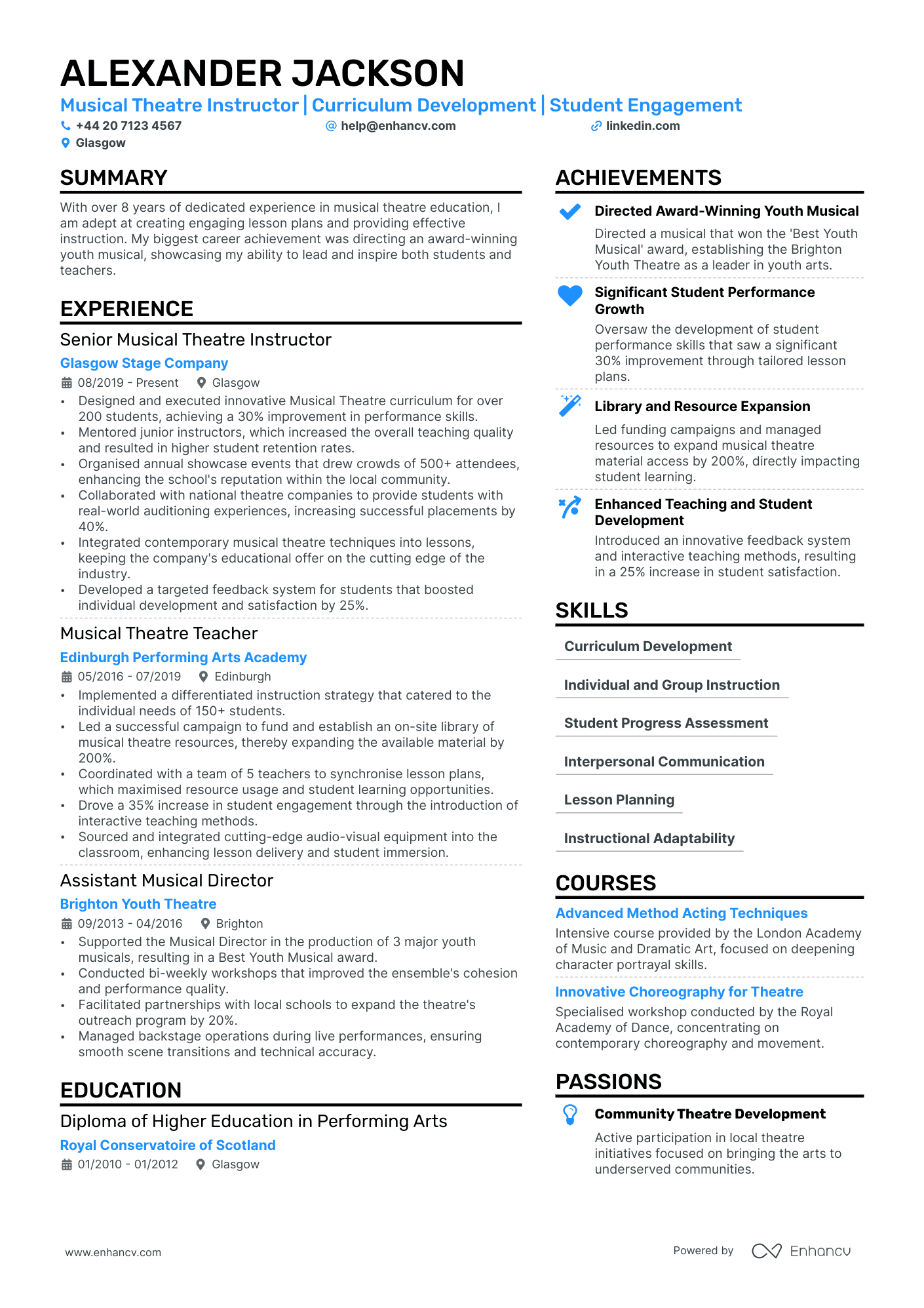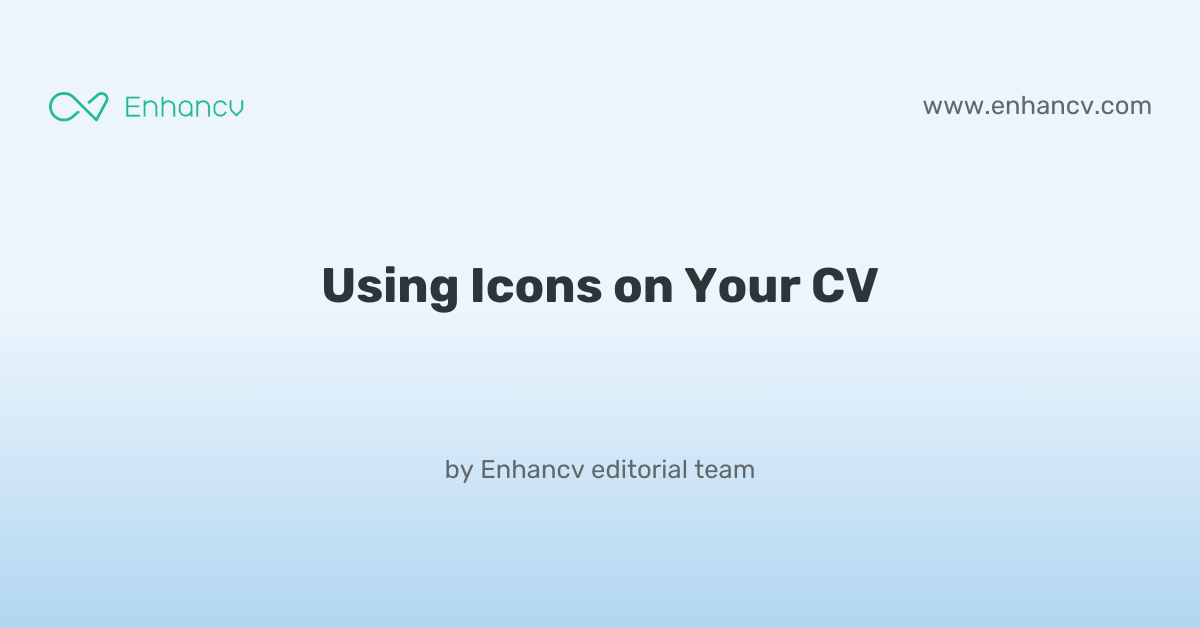One significant CV challenge in the musical theatre industry is crafting a resume that effectively showcases your diverse range of skills, from singing and acting to dance and stage combat. Our guide offers detailed strategies and examples to help you highlight your multifaceted talents in a way that resonates with casting directors and gets you noticed.
- Create an attention-grabbing header that integrates keywords and includes all vital information;
- Add strong action verbs and skills in your experience section, and get inspired by real-world professionals;
- List your education and relevant certification to fill in the gaps in your career history;
- Integrate both hard and soft skills all through your CV.
Discover more industry-specific guides to help you apply for any role in the links below:
Formatting your musical theatre CV to meet the role expectations
Staring at the blank page for hours on end, you still have no idea how you should start your professional musical theatre CV. Should you include more colours, two columns, and which sections? What you should remember about your CV format is this - ensure it's minimalistic and doesn't go over the top with fancy fonts and many colours. Instead, focus on writing consistent content that actually answers the job requirements. But, how about the design itself :- Use the reverse chronological order to showcase your experience, starting with your most recent role;
- Include your contact details (email address, phone number, and location) - and potentially your professional photo - in the header;
- Must-have CV sections include summary or objective, experience, education, and skills: curate the ones that fit your profile;
- Your professional musical theatre CV should be between one-to-two pages long: select the longer format if you have more experience.
A little bit more about your actual CV design, ensure you're using:
- plenty of serif or sans serif font (e.g. Montserrat, Exo 2, Volkhov) as they are Applicant Tracker System (ATS) compliant. Avoid the likes of Arial and Times New Roman because most candidates' CVs are in this typography.
When submitting your CV, are you still not sure what format it should be? Despite the myth that has been circling around, most modern ATS systems are perfectly capable of reading PDFs. This format is an excellent choice as it keeps all of your information intact.
PRO TIP
Be mindful of white space; too much can make the CV look sparse, too little can make it look cluttered. Strive for a balance that makes the document easy on the eyes.
The top sections on a musical theatre CV
- Personal details include your contact information.
- Performance experience showcases your past roles.
- Vocal range highlights your singing capabilities.
- Dance proficiency demonstrates movement skills.
- Education and training reflect relevant background.
What recruiters value on your CV:
- Highlight your vocal range and any dance training as musical theatre often requires performers who are versatile in both singing and dancing.
- Include a detailed list of previous musical theatre roles, specifying the character played, the production name, and the director or theatre company to showcase your experience.
- Emphasize your ability to read and interpret music by mentioning any musical instruments you play or any formal singing education you have received.
- Provide a link to a personal website or online showreel that includes clips of your performances to give directors a sense of your stage presence and capabilities.
- Include any accomplishments or awards received in the realm of musical theatre to demonstrate recognition of your talents and commitment to the craft.
Recommended reads:
Making a good first impression with your musical theatre CV header
Your typical CV header consists of Your typical CV header consists of contact details and a headline. Make sure to list your professional phone number, email address, and a link to your professional portfolio (or, alternatively, your LinkedIn profile). When writing your CV headline , ensure it's:
- tailored to the job you're applying for;
- highlights your unique value as a professional;
- concise, yet matches relevant job ad keywords.
You can, for examples, list your current job title or a particular skill as part of your headline. Now, if you decide on including your photo in your CV header, ensure it's a professional one, rather than one from your graduation or night out. You may happen to have plenty more questions on how to make best the use of your CV headline. We'll help you with some real-world examples, below.
Examples of good CV headlines for musical theatre:
- "Eva Perón in 'Evita' | Vocal Range: Mezzo-Soprano | Dance: Jazz, Tap | 5 Years Experience"
- "Jean Valjean in 'Les Misérables' | Drama Graduate | Combat Certified | Tenor | 8 Years On Stage"
- "Roxie Hart in 'Chicago' | Triple Threat Performer | Choreography Enthusiast | 3 Years Professional"
- "Simba in 'The Lion King' | BFA Musical Theatre | Voice Over Artist | Baritone | 10+ Years"
- "The Phantom in 'The Phantom of the Opera' | Vocal Coach | Mask Work Specialist | 15 Years Leading Roles"
- "Maria in 'West Side Story' | Conservatoire-trained Soprano | Fluent in Spanish | Dance Captain | 6 Years Experience"
What's the difference between a musical theatre CV summary and objective
Why should it matter to you?
- Your musical theatre CV summary is a showcasing your career ambitions and your unique value. Use the objective to answer why your potential employers should hire you based on goals and ambitions. The objective is the ideal choice for candidates who happen to have less professional experience, but still meet some of the job requirements.
Before you select which one will be more relevant to your experience, have a look at some industry-leading CV summaries and objectives.
CV summaries for a musical theatre job:
- With over a decade of experience commanding stages across the UK, I am a seasoned musical theatre performer versed in both classic and contemporary repertoire. Notable for leading roles in award-winning productions at the West End, my prescient interpretative skills and dynamic vocal range have been my career highlights.
- Enthusiastic about crafting compelling narratives through song, I carry three years of rigorous training at the Royal Academy of Dramatic Art and five years of performance in regional theatres. Mastery of dance and the Stanislavski method propels my compelling performances, particularly as Mercutio in a recent touring production of 'Romeo and Juliet'.
- A professional ballet dancer with two decades of performances, I am pivoting into musical theatre to blend my expertise in dance with a burgeoning passion for vocal performance. Excelling in physical storytelling, I bring a unique perspective and keen desire to contribute to interpretive ensemble pieces in this vibrant art form.
- Bringing forward a career as a classical vocalist, I am transitioning to musical theatre to expand my performance repertoire. With ten years of stage experience and an extensive background in vocal technique, my aim is to merge my operatic precision with the expressive demands of musical theatre storytelling.
- Eager to immerse myself in the world of musical theatre, my objective is to leverage my fresh perspective and adaptability to excel in high-paced ensemble work. My commitment to comprehensive theatrical training and a collaborative spirit will serve as catalysts for delivering impactful stage performances.
- An aspiring thespian with a true ardour for the performing arts, I seek to infuse my nascent career with the richness of musical theatre. My objective is to hone my performance skills through diverse roles, engaging with seasoned professionals to transform my potential into captivating stage presences.
How to meet job requirements with your musical theatre CV experience
We've now reached the essence of your actual CV - your experience section. This is the space where you can list your career roles and on-the-job successes. Many candidates tend to underestimate just how much time and effort they should put into writing this CV section. Your experience shouldn't be a random list of your responsibilities, but instead:
- Match the job description with your skills, values, and accomplishments;
- Start each bullet with a strong action verb, followed up with one key skill and your outcome of applying this skill;
- Spotlight parts of your career history that are relevant to the job you're applying for.
Before we move on, make sure to check out some professional CV experience sections.
Best practices for your CV's work experience section
- List your most relevant or recent theatrical experiences first, showing a pattern of growth and development in your musical theatre career.
- Include the title of the show, your role, the production company or theatre, and the dates of the performance to provide clear context for each experience.
- Emphasise any leading roles or significant achievements, such as critical acclaim or awards, to highlight your capabilities as a performer.
- Detail any specialised skills used in your performances, such as dance styles, combat techniques, or instrument playing, which are pertinent to musical theatre.
- Mention notable directors, choreographers, or musical directors you've worked with to showcase the professional level of your experience.
- Specify if you have played roles that required a particular vocal range or style, demonstrating your versatility and suitability for various parts in musicals.
- Include any relevant workshops, masterclasses, or training that are specific to musical theatre to illustrate your commitment to ongoing development in the field.
- Highlight experiences where you’ve contributed to the creative process, such as creating original music or assisting in choreography, to show additional skill sets.
- Briefly touch upon collaborative experiences, such as ensemble work or casts of varying sizes, to display your ability to work as part of a team.
- Spearheaded a cast of 25 in a critically-acclaimed production of 'Les Misérables', selling out a 6-week run at Broadway Theatre.
- Pioneered the use of immersive projection technology to enhance storytelling, increasing audience engagement by 40%.
- Collaborated with a diverse creative team to develop and refine the show's choreography, sound, and lighting design, leading to a nomination for a Tony Award for Best Musical.
- Played a key role in the development of a new, contemporary musical, contributing to script and score workshops that led to a successful off-Broadway opening.
- Provided vocal coaching and mentorship to a troupe of 10 emerging actors, improving overall performance quality and receiving outstanding cast ensemble reviews.
- Initiated community outreach programs, involving local schools in theatre arts, effectively raising program funding by 25% through public interest and grants.
- Led as the romantic lead in a summer stock production of 'West Side Story', resulting in a 20% increase in attendance from the previous summer season.
- Managed and conducted auditions, selecting and casting actors for various roles, while also overseeing rehearsals to ensure a cohesive ensemble performance.
- Introduced a successful workshop series that taught hundreds of students about the intricacies of musical theatre performance, greatly enhancing the company's educational outreach.
- Performed in over 300 shows across North America, portraying leading roles in musicals such as 'Hairspray' and 'The Phantom of the Opera'.
- Liaised with directors and other performers to ensure a high-standard of production values, contributing to the company winning the National Theatre Company Award.
- Implemented and directed a successful understudy program that prepared backup performers, ensuring seamless transitions and maintaining quality during unforeseen actor absences.
- Expertly performed across three theatre productions concurrently, including 'Rent', 'Chicago', and 'The Wiz', showcasing versatility and stamina.
- Negotiated contract provisions for the entire cast, resulting in improved working conditions and an additional 10% compensation bonus for extended runs.
- Elevated performance quality by initiating a peer-review system, allowing cast members to give and receive constructive feedback, leading to more nuanced performances.
- Successfully adapted and directed a modern interpretation of 'A Chorus Line', which played to full houses and received local media acclaim.
- Coordinated with set, costume, and lighting designers to ensure the artistic vision was realized on stage, resulting in a cohesive and visually stunning production.
- Developed a ticketing strategy with marketing teams that maximized theatre occupancy and revenues, contributing to a 15% increase in annual profit for the theatre.
What to add in your musical theatre CV experience section with no professional experience
If you don't have the standard nine-to-five professional experience, yet are still keen on applying for the job, here's what you can do:
- List any internships, part-time roles, volunteer experience, or basically any work you've done that meets the job requirements and is in the same industry;
- Showcase any project you've done in your free time (even if you completed them with family and friends) that will hint at your experience and skill set;
- Replace the standard, CV experience section with a strengths or achievements one. This will help you spotlight your transferrable skills that apply to the role.
Recommended reads:
PRO TIP
Describe how each job helped you grow or learn something new, showing a continuous development path in your career.
Describing your unique skill set using both hard skills and soft skills
Your musical theatre CV provides you with the perfect opportunity to spotlight your talents, and at the same time - to pass any form of assessment. Focusing on your skill set across different CV sections is the way to go, as this would provide you with an opportunity to quantify your achievements and successes. There's one common, very simple mistake, which candidates tend to make at this stage. Short on time, they tend to hurry and mess up the spelling of some of the key technologies, skills, and keywords. Copy and paste the particular skill directly from the job requirement to your CV to pass the Applicant Tracker System (ATS) assessment. Now, your CV skills are divided into:
- Technical or hard skills, describing your comfort level with technologies (software and hardware). List your aptitude by curating your certifications, on the work success in the experience section, and technical projects. Use the dedicated skills section to provide recruiters with up to twelve technologies, that match the job requirements, and you're capable of using.
- People or soft skills provide you with an excellent background to communicate, work within a team, solve problems. Don't just copy-paste that you're a "leader" or excel at "analysis". Instead, provide tangible metrics that define your success inusing the particular skill within the strengths, achievements, summary/ objective sections.
Top skills for your musical theatre CV:
Singing Technique
Dance Training
Acting Ability
Stage Combat
Musical Instrument Proficiency
Voice Projection
Reading Music
Harmonisation
Improvisation
Characterisation
Creativity
Teamwork
Discipline
Adaptability
Emotional Intelligence
Time Management
Resilience
Attention to Detail
Communication
Problem-Solving
PRO TIP
Order your skills based on the relevance to the role you're applying for, ensuring the most pertinent skills catch the employer's attention first.
Education and more professional qualifications to include in your musical theatre CV
If you want to showcase to recruiters that you're further qualified for the role, ensure you've included your relevant university diplomas. Within your education section:
- Describe your degree with your university name(-s) and start-graduation dates;
- List any awards you've received, if you deem they would be impressive or are relevant to the industry;
- Include your projects and publications, if you need to further showcase how you've used your technical know-how;
- Avoid listing your A-level marks, as your potential employers care to learn more about your university background.
Apart from your higher education, ensure that you've curated your relevant certificates or courses by listing the:
- name of the certificate or course;
- name of the institution within which you received your training;
- the date(-s) when you obtained your accreditation.
In the next section, discover some of the most relevant certificates for your musical theatre CV:
PRO TIP
Focus on describing skills in the context of the outcomes they’ve helped you achieve, linking them directly to tangible results or successes in your career.
Recommended reads:
Key takeaways
Your successful job application depends on how you well you have aligned your musical theatre CV to the job description and portrayed your best skills and traits. Make sure to:
- Select your CV format, so that it ensures your experience is easy to read and understand;
- Include your professional contact details and a link to your portfolio, so that recruiters can easily get in touch with you and preview your work;
- Write a CV summary if you happen to have more relevant professional experience. Meanwhile, use the objective to showcase your career dreams and ambitions;
- In your CV experience section bullets, back up your individual skills and responsibilities with tangible achievements;
- Have a healthy balance between hard and soft skills to answer the job requirements and hint at your unique professional value.
